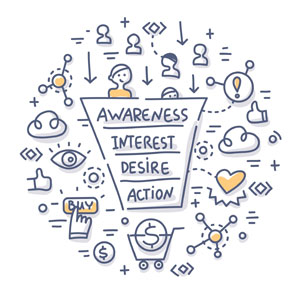13 Reasons Why Campaigns Fall Short of Their Objectives
Let’s first start by defining what a marketing campaign is and what it isn’t. Marketing campaigns are used as a company’s efforts to promote a specific goal, such as introducing a new product, increasing sales of a particular service, driving downloads of lead magnets, growing a social media following, or email subscriber list. Effective campaigns are designed to reach a specific audience in various ways and involve a combination of many media platforms.
Many times people miss the point that a marketing campaign isn’t a one-and-done effort. A Facebook LinkedIn ad would be only one tactic of an overall marketing campaign process to get the desired result. Many other elements might be combined with downloadable content, email marketing for nurturing, blog posts, or video to generate more awareness. Depending on your goals and objectives once can be crafted for you to succeed but other times they fall flat of management’s expectations.
The Thirteen Reasons Why Many Marketing Campaigns Fail
- Not Having A Clear Marketing Strategy or Plan – At the core of any business is a great marketing plan! Forrester’s commented that 80% of companies take little or no time in planning how they are going to reach their ideal customer or even have a marketing plan of any kind. Many of the customers we work with start with us start without a marketing plan. having a well-crafted comprehensive marketing plan gives you the right tools and a winning plan to grow and thrive.
- Weak Online Presence – Your first impression is everything when potential buyers are researching your product and services. According to the recent 2021 IDG Customer Engagement research, 72% of tech buyers consider a vendor that educates them through the decision-making process. Prospects want more these days than “brochureware” they want to be lead through a story or journey. a strong web presence that tells the story of your company and your products. A strong web presence is mission-critical in getting people to interact with your brand in today’s digital world.
 Absence of Quality Content – These days, people will not give you their information if you aren’t offering something of real value that will help solve their problem. In the 2021 IDG Customer Engagement survey mentioned above, 87% of technology buyers stated they are willing to register for content; however, only 41% of downloaded work-related content provided buyers with value over the past 12 months. Your website visitors what the content on your website to be valuable and easy to digest.
Absence of Quality Content – These days, people will not give you their information if you aren’t offering something of real value that will help solve their problem. In the 2021 IDG Customer Engagement survey mentioned above, 87% of technology buyers stated they are willing to register for content; however, only 41% of downloaded work-related content provided buyers with value over the past 12 months. Your website visitors what the content on your website to be valuable and easy to digest.- Your Message Doesn’t Resonate with your Targeted Audience – Either your message is too complex, or you have missed the mark in terms of understanding your ideal customer and their pain points. If your website is not clear, too complicated, or if people don’t see it as a resource, they will more than likely not engage with you.
- Misread Market Readiness – We see this oftentimes with many start-up clients. They have developed a product based on some new technology, and they are early to market or are trying to solve a problem that either doesn’t exist or is not well understood. Generating sales leads, specifically, buyers entering the sales cycle is very difficult when the technology has not crossed the chasm or is not well understood.
- Expecting Immediate Results – Many campaigns fail because you don’t give them enough time to play out in order to reach their full potential. Campaigns evolve overtime to get the results you want based on the complexity of the offer. For example, you may not see the results of an SEO campaign for six months or longer.
- Not Taking an Integrated Approach – This is an important factor in any campaign success. If you are only using one tactic, then it is likely that you will not reach your goals. You need to take an integrated approach and include several clearly identified marketing channels into your program that you have identified for your company. For example, social media ad reach is dependent on how often your audience visits/uses social media. Many B2B buyers do not use social media daily, and that is why you may want to also consider other marketing channels to expand the likelihood of your targeted audience receiving your message.
- Trying to Accomplish Too Much With One Campaign – Diluted campaigns rarely succeed. Common goals of a well-crafted campaign include thing like promoting a new product or service, increasing brand awareness, gather customer feedback, generate revenue, boost user engagement or advertise an upcoming event. Trying to accomplish too many things with one budget and one campaign is likely to swing and miss its intended result. focus on accomplishing a very specific goal per campaign.
- You Don’t Understand Your Customer’s Journey – Even if you create the perfect campaign and message, it won’t lead to success if your message isn’t delivered to the prospect at the right time. You need to have a strong understanding of your prospect, their purchasing patterns, behaviors, and decision-making process which requires research, tracking, and analyzing customer engagement to understand the buyer’s purchasing journey.
- Marketing and Sales Are Not Aligned – today having Sales and Marketing departments working in concert with each other is mission-critical. Successful lead follow-up can make or break a campaign. The marketing team working with the sales team together should agree on what constitutes a qualified sales lead and the process of handoff between teams. Including the sales team gives the marketing team the pertinent information throughout the campaign on what is resonating with prospects and what isn’t working during the campaign as well.
- Product Quality/Failure – Like in everything don’t overpromise and underdeliver with the campaigns you run. Ensure your product is shipping and fully test ready to go when you launch your campaign. The quickest way to undermine customer/market trust is to not be able to deliver a product when you have just promoted it or to deliver a product that really isn’t ready for prime time yet.
- Marketing Strategy Isn’t Aligned With Your Tactics – Your marketing strategy is the game plan for your campaigns and tactics are the plays that are created out of your playbook. Sometimes executives will request a specific tactic because they heard at a conference or from a friend that it works. If the tactic doesn’t align with your marketing strategy, then you run the risk it will not achieve the desired result.
- Using The Wrong Systems to Execute and Measure Your Campaign – As organizations scale, they add to their technology stack to manage and measure company results and processes. Often times sales and marketing activities use different tools, making it hard to get a clear view into prospect responses to marketing campaigns and other marketing channels. The assets and data you need to make sound business decisions. Standardizing corporate tech stacks across the company makes communications and decisions based on the data received simpler and clear to grow your company faster.

